The Android’s Dream: A Review
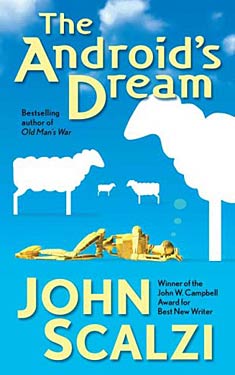 John Scalzi has become an author that I look forward to reading in the last few years. Up to this point, I’ve only read his Old Man’s War series of novels, starting with Old Man’s War, so The Android’s Dream was my first foray into his unrelated novels.
John Scalzi has become an author that I look forward to reading in the last few years. Up to this point, I’ve only read his Old Man’s War series of novels, starting with Old Man’s War, so The Android’s Dream was my first foray into his unrelated novels.
The title refers to a genetically modified and very rare breed of sheep with electric-blue wool. This particular breed is needed for a coronation ceremony on the planet Nidu. Harry Creek, war hero and diplomat who specializes in delivering bad news to the various sentient species living here on Earth, has been tasked by his government to find an Android’s Dream sheep before it’s too late for the ceremony, which could throw Earth into war with the Nidu, whose alliance is essential yet tenuous. His search takes him to a mall pet shop specializing in genetically unmodified pets, and a meeting with the shop’s owner, Robin Baker. But Harry’s not the only person trying to find the rare sheep, including many who wish for the ceremony to fail.
The book is very fast paced, jumping from point of view to point of view, watching events unfold from different angles. The view point of some of the aliens is interesting, as Scalzi tries to show things from their non-human perspective. He pulls this off with modest success, as the view points are different, but in a Star Trek kind of way. There are the back-stabbers, the warriors, the strategists, etc., in other words, different angles of the human condition. This is not a negative, I’m merely pointing out that the view from an alien has been done better before, as with Michael Valentine Smith in Heinlein’s Stranger in a Strange Land, or the visiting alien in the John Carpenter movie Starman. This brings up a good subject. Best alien point-of-view novels and movies?
Harry Creek is an interesting character with some depth, and he helps keep you the reader invested in the story, and its outcome. He’s a man with a history that comes out a little at a time, and Scalzi writes him to be modest and noble, even in compromising situations. You root for him as he tries to keep one step ahead of those that wish him and Earth harm.
This was a fun story, and I liked it enough that I’m now placing other novels from John Scalzi on my reading list, such as Agent to the Stars.
I recommend The Android’s Dream very highly, and will give it a 9 out of 10 for its quick-paced adventure.
The Missing Links of Artificial Intelligence
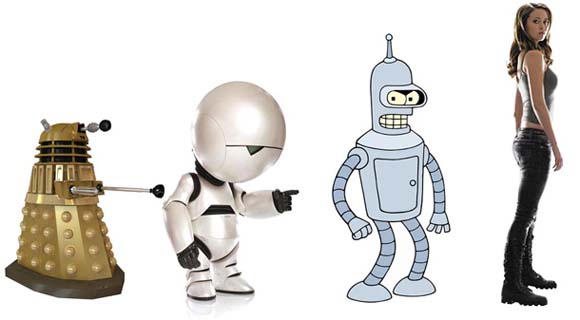
As mentioned earlier, Robert J. Sawyer was in town on Wednesday and gave a talk at UT Dallas about the future of technology. Some of the responsible parties and I attended and listened to his thoughts on Artificial Intelligence, and how its inevitable emergence will affect the world. Sawyer pulled a lot of his thoughts explicitly from his WWW trilogy, and expounded on the philosophy behind his fictional speculations. In the midst of all this, he touched on evolution, ancient human history, the existence of God, and Hollywood’s ambivalent take on A.I. Sawyer’s talk was most interesting to me, however, because of his speculations on the roots and causes of consciousness and intelligence.
 His take on consciousness was stereotypically deterministic and materialistic, which I’ve never found satisfying. For Sawyer, consciousness and self-awareness are simply the results of a certain level of complexity, and it is something that spontaneously occurs at a particular degree of brain development, as if life had hit a saturation point. Even though I am Catholic, the Church doesn’t have much doctrine about consciousness as such, and Catholic theologians who do talk about consciousness generally are repeating Aristotle through the middle-man of St. Thomas Aquinas. It is fitting, I suppose, that a religious body should be more concerned with things that are in the realm of divine revelation (like the immortality of the human soul), and less with speculations about the natural world (like the nature of consciousness).
His take on consciousness was stereotypically deterministic and materialistic, which I’ve never found satisfying. For Sawyer, consciousness and self-awareness are simply the results of a certain level of complexity, and it is something that spontaneously occurs at a particular degree of brain development, as if life had hit a saturation point. Even though I am Catholic, the Church doesn’t have much doctrine about consciousness as such, and Catholic theologians who do talk about consciousness generally are repeating Aristotle through the middle-man of St. Thomas Aquinas. It is fitting, I suppose, that a religious body should be more concerned with things that are in the realm of divine revelation (like the immortality of the human soul), and less with speculations about the natural world (like the nature of consciousness).
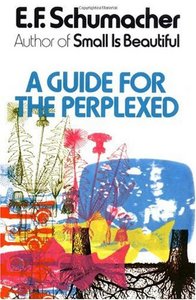 One of the best books I’ve read on the nature of consciousness in all its different forms is E.F. Schumacher’s A Guide for the Perplexed, originally published in 1977. Schumacher pulls a great deal from classical and medieval philosophy about the human mind, and spends a lot of time explaining the ancient idea of the Great Chain of Being. He thus divides the sensible world (i.e., the world that can be observed by the senses) into four, sharply divided areas: mineral, vegetable, animal and human. The higher levels contain all the powers and substances of the lower, but not the other way around. For instance, minerals are composed of matter, and that matter is dead and simply obeys the physical laws of the universe according to its particular composition; however, vegetation is composed of matter but is also alive, and has a life-principle that minerals do not have, which allows it to grow and care for its own being. Animals possess the powers of the two lower levels, as well as the powers of consciousness (in the sense of being aware of the world) and self-produced locomotion. Man, according to Schumacher, possesses all of these powers with the addition of self-awareness, the ability to think about one’s own thinking. Each level evinces an increase not only in power, but also in freedom: a gecko skittering about has more freedom of motion and choice than does the rock it’s skittering upon.
One of the best books I’ve read on the nature of consciousness in all its different forms is E.F. Schumacher’s A Guide for the Perplexed, originally published in 1977. Schumacher pulls a great deal from classical and medieval philosophy about the human mind, and spends a lot of time explaining the ancient idea of the Great Chain of Being. He thus divides the sensible world (i.e., the world that can be observed by the senses) into four, sharply divided areas: mineral, vegetable, animal and human. The higher levels contain all the powers and substances of the lower, but not the other way around. For instance, minerals are composed of matter, and that matter is dead and simply obeys the physical laws of the universe according to its particular composition; however, vegetation is composed of matter but is also alive, and has a life-principle that minerals do not have, which allows it to grow and care for its own being. Animals possess the powers of the two lower levels, as well as the powers of consciousness (in the sense of being aware of the world) and self-produced locomotion. Man, according to Schumacher, possesses all of these powers with the addition of self-awareness, the ability to think about one’s own thinking. Each level evinces an increase not only in power, but also in freedom: a gecko skittering about has more freedom of motion and choice than does the rock it’s skittering upon.
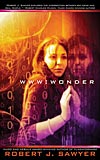 But intelligence really isn’t the same thing as consciousness or self-awareness. Even a flower has a certain level of intelligence in that it “knows” how to process minerals and water and sunlight to its own advantage, and on the cellular level it works almost programmatically to achieve its goals. In this sense, even an automated machine—which is composed of dead minerals—is intelligent, whether it be a train or a computer. Artificial Intelligence has been with us for a long time. What people really mean when they talk about A.I. is Artificial Self-Awareness (A.S.A.), which, if you’re following Schumacher’s levels, must in the case of computers skip all the way from "mineral" to "man." It is something that spontaneously assumes upon itself all the powers of life, consciousness and self-awareness without gradually moving through any stages in-between. Even if one accepts Sawyer’s thesis that human self-awareness was the result of a slow increase in complexity, it is still the increasing complexity of an already-living species. A.S.A. would seem to require the preexistence of a living computer, and then a conscious (aware) computer; only after these things could we expect self-awareness. In WWW: Wake, however, the computerized life-form that subsists in the Internet awakens fully-formed as an A.S.A. without any intermediate stages.
But intelligence really isn’t the same thing as consciousness or self-awareness. Even a flower has a certain level of intelligence in that it “knows” how to process minerals and water and sunlight to its own advantage, and on the cellular level it works almost programmatically to achieve its goals. In this sense, even an automated machine—which is composed of dead minerals—is intelligent, whether it be a train or a computer. Artificial Intelligence has been with us for a long time. What people really mean when they talk about A.I. is Artificial Self-Awareness (A.S.A.), which, if you’re following Schumacher’s levels, must in the case of computers skip all the way from "mineral" to "man." It is something that spontaneously assumes upon itself all the powers of life, consciousness and self-awareness without gradually moving through any stages in-between. Even if one accepts Sawyer’s thesis that human self-awareness was the result of a slow increase in complexity, it is still the increasing complexity of an already-living species. A.S.A. would seem to require the preexistence of a living computer, and then a conscious (aware) computer; only after these things could we expect self-awareness. In WWW: Wake, however, the computerized life-form that subsists in the Internet awakens fully-formed as an A.S.A. without any intermediate stages.
Where are the missing links?
Do Androids Dream of Electric Sheep?
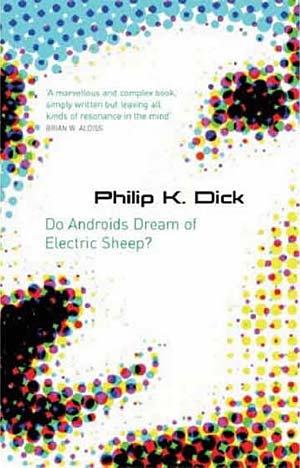 Like all of Philip K. Dick’s novels, Do Androids Dream of Electric Sheep? is a strange blend of reality and unreality. It has been a full month since I finished reading the novel, and I’ve put off writing a review because it’s hard to know what to say about it. The basic plot of the book, which survived mostly intact in the film adaptation Blade Runner, has as its protagonist Rick Deckard, a bounty hunter who hunts androids, robotic beings who are indistinguishable from humans except for their total lack of empathy. The lead bounty hunter has been taken down by an android, and this is Deckard’s chance to make some money he desperately needs. He proceeds to pick off the androids one by one, and the story ends when his task is complete. Ridley Scott’s film used this plot as a vehicle for dystopian and weirdly demonic imagery, and to create a film noir-like mood. Dick uses it like he usually does, as a tool for examining the tension between reality and fantasy.
Like all of Philip K. Dick’s novels, Do Androids Dream of Electric Sheep? is a strange blend of reality and unreality. It has been a full month since I finished reading the novel, and I’ve put off writing a review because it’s hard to know what to say about it. The basic plot of the book, which survived mostly intact in the film adaptation Blade Runner, has as its protagonist Rick Deckard, a bounty hunter who hunts androids, robotic beings who are indistinguishable from humans except for their total lack of empathy. The lead bounty hunter has been taken down by an android, and this is Deckard’s chance to make some money he desperately needs. He proceeds to pick off the androids one by one, and the story ends when his task is complete. Ridley Scott’s film used this plot as a vehicle for dystopian and weirdly demonic imagery, and to create a film noir-like mood. Dick uses it like he usually does, as a tool for examining the tension between reality and fantasy.
The very first sentence of the book describes a “merry little surge of electricity piped… from the mood organ.” The mood organ is a tool for controlling emotions, and is a much-desired commodity in a world that is barely surviving after a nuclear catastrophe. If you don’t want to wake up in the morning, the organ can make you glad to be awake. If you are depressed, the organ can fill you with bliss. It has the effects of mood-altering drugs without (apparently) any unwanted physical side effects. The other machine which plays a large role in the novel is the empathy box, which is used primarily by followers of a religion called Mercerism as a way of sharing emotions and images with other people who are using the box at the same time. Both machines, notably, are tools for escaping interaction with reality.
And reality in the future of Androids is indeed bleak. The nuclear wars have irradiated much of the world, leading to genetic disintegration, mass animal extinctions, and popular immigration movements off-planet to Mars. Animal husbandry is considered a civic duty for those who can afford it, and a moral duty for followers of Mercerism. Those who cannot afford a real animal buy cheaper robotic “electric” models. The skies are always discolored, entire swaths of continents are wastelands, and ambient radiation transforms intelligent people into “chickenheads” by rotting their brains. The androids of the novel are not the wonder-experiencing replicants of the film; they are harsh and uncaring, empathizing not even with the death of one of their own. It is no wonder that the inhabitants of Earth escape reality through mood alterations and hallucinogens. Likewise, even the inhabitants of the supposedly nicer Mars seek an escape through the fantastic, adventurous science fiction novels of the past—one thinks of the novels of E. E. “Doc” Smith—because the reality of their situation is hardly like it appeared on the travel ads.
Deckard’s final triumph is a mixed one. Strange things happen with Mercerism and a vision Deckard has of its supposed founder. Likewise, his path intersects with an animal in such a way that leads to a brave act of acceptance of reality. Reality in this novel, as in all of Dick’s novels, is hard, but still worth pursuing for its own sake. The truth is its own reward, despite its difficulties.



















 Full Details
Full Details

